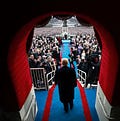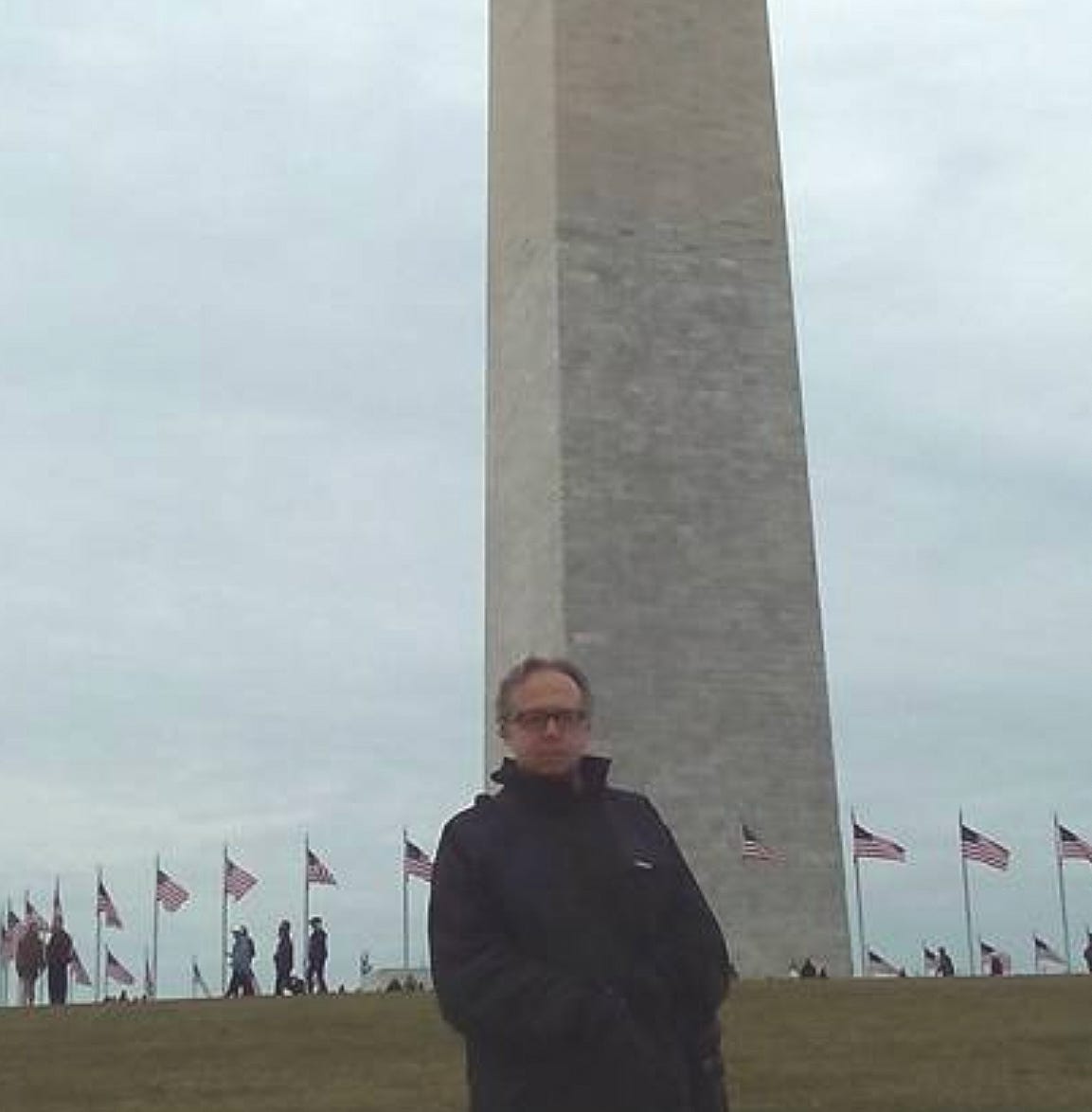JANUARY 20, 2017: TRUMP INAUGURATION DAY
This Should Have Been the Beginning of the End, It Wasn't
On Inauguration Day 2017 I was in Washington DC recording a BBC Radio 4 documentary covering Trump’s first 100 days in office and filing the report below for the Observer newspaper in Britain. This was a First Rough Draft of History. Eight years later does the draft hold up? What about him and his MAGA acolytes is different? Anything?
This was real. This was not a nightmare from which you could force yourself awake.
Donald Trump raised his hand and took the oath of office, then delivered his inaugural address. Standing just downslope from the Washington Monument, among a surprisingly sparse crowd watching on a giant television screen, I had to remind myself “This is real” because within seconds the new president had shredded the framework through which his predecessors had viewed the world and interpreted America’s role in it for the last three-quarters of a century.
More astonishing than that, in his 1,433-word speech he had expressed himself in a way that no other president has ever done: using the rhetorical repetitions and elisions of fact associated with speeches by blood-and-soil nationalist leaders who have led their countries to disaster.
An era, a transformation was at hand, said the new president:
“This American carnage stops right here and stops right now.”
Trump continued:
“From this day forward, a new vision will govern our land. From this day forward, it’s going to be only America first. America first.”
Many commentators have noted that the phrase “America first” was used in the late 1930s by fascist sympathiser Charles Lindbergh and other isolationists. But most Trump voters won’t be aware of the historical allusion. They support him because of what he said next:
“Every decision on trade, on taxes, on immigration, on foreign affairs will be made to benefit American workers and American families.”
The fact that the man speaking those words had employed undocumented immigrants on his building projects and boasted about not paying taxes is secondary to those who voted for him. For his supporters, just the promise is enough.
This was a campaign speech rather than an inaugural address. On a May morning 20 years ago, Tony Blair said: “We campaigned as New Labour and we will govern as New Labour.” Trump campaigned as Trump and, pretty clearly, he intends to govern as Trump.
World leaders, especially those of traditional American allies, will have to adjust to this man whose worldview is isolationist and whose leadership practice is based on bullying, hectoring and outright lying. He will be a president unmoored from the restraint of facts.
There were echoes of the past throughout the speech. One can’t say whether this was intended allusion or whether he was just copying hastily: “The forgotten men and women of our country will be forgotten no longer” is a direct take from Franklin Delano Roosevelt’s Forgotten Man campaign speech of 1932.
The Republican agenda for more than half a century has been the dismantling of Franklin Roosevelt’s New Deal, yet it was Trump who was channelling FDR throughout the campaign. You wonder why the Democratic candidate, Hillary Clinton, had failed to do the same. Trump sounded genuinely sincere when he spoke of the pain symbolised by “rusted-out factories scattered like tombstones across the landscape of our nation”.
During the campaign, I reported from Ohio, a place I know well, and I was shocked by how these rotting monuments of deindustrialisation had yet to be replaced. Trump blames the wreckage on “disastrous” free-trade agreements like 1994’s Nafta agreement. The reality, of course, is that the factories were emptied out long before the ink was dry on the Nafta agreement. The term “rust-belt” had been in use for a decade-and-a-half before that early milestone on the road to globalisation was signed. The sudden devastation of rust-belt communities following the oil price shock of 1973 provided the material for Bruce Springsteen’s rise to megastardom later that decade.
Springsteen played a private gig for President Obama’s staff last week. Did those in attendance and those in the elite circles of the Democratic party leadership think that the world the Boss created on The River and Nebraska came out of nothing? That the scars of those brutal years had gone away? Did they really think that those fat GDP figures and Obama’s job creation record meant all boats had been lifted on a rising tide? Why is it that a nationalist demagogue has to be the one to say: “The establishment protected itself but not the citizens of our country.” These lines were cheered by the people I was standing with, the Washington Monument up the slope to our right, the White House visible to our left.
The last time I had been in a crowd on this spot was in May 1970, a few days after the Kent State massacre.
America was already divided then. Those of us who had long hair and beards were told: “America: love it or leave it.” The language has changed over the decades and those who have long hair and beards, albeit grey, have changed as well. In this crowd they are the Trump supporters. They cheered as he reached the climax of his speech with a slightly different way of saying: America: love it or leave it.
“At the bedrock of our politics will be a total allegiance to the United States of America and through our loyalty to our country we will rediscover our loyalty to each other. When you open your heart to patriotism there is no room for prejudice.”
The Teutonic cadence and repetition was chilling to the anti-Trump folks in the crowd. The chill deepened as he emphasised the word “will” eight times in the final minute of his speech.
“You will never be ignored again. Your voice, your hopes and your dreams will define our American destiny. And your courage and goodness and love will forever guide us along the way.
“Together we will make America strong again. We will make America wealthy again.
“We will make America proud again. We will make America safe again. And, yes, together, we will make America great again.”
This triumph of the word “will” has its echoes in history. But the America Trump is describing is not reeling from defeat in a world war, nor has it, for all its inequality, just staggered out of a catastrophic economic collapse. Nor is it unsafe, as the crime figures demonstrate.
“We’re an empire now and when we act, we create our own reality,” Karl Rove, adviser to George W Bush, is reputed to have boasted in the heady days after Saddam Hussein was overthrown and before the reality of Iraq began to cost Americans – and Iraqis – their lives. Trump is a man who creates his own reality and lives in it. The rest of America and the world will have to decide whether it wants to join him there or convince him that his “reality” is actually a fantasy and he needs to be disabused of it.
The calamity that Donald Trump represents continues to consume America. It is eight years since he first ran for President. Time should bring change but American society seems stuck in the Trump era. Exploring why is the task, regardless of who wins the election.
One thing that has changd in Trump’s time is that journalism is organized differently. I am covering this election — based in Georgia and North Carolina — for my own FRDH, First Rough Draft of History podcast and substack newsletter, and I need your financial support. There are two ways you can do it:
OR TAKE OUT A PAID SUBSCRIPTION HERE
OR HERE
And a reminder that History of a Calamity begins here:





